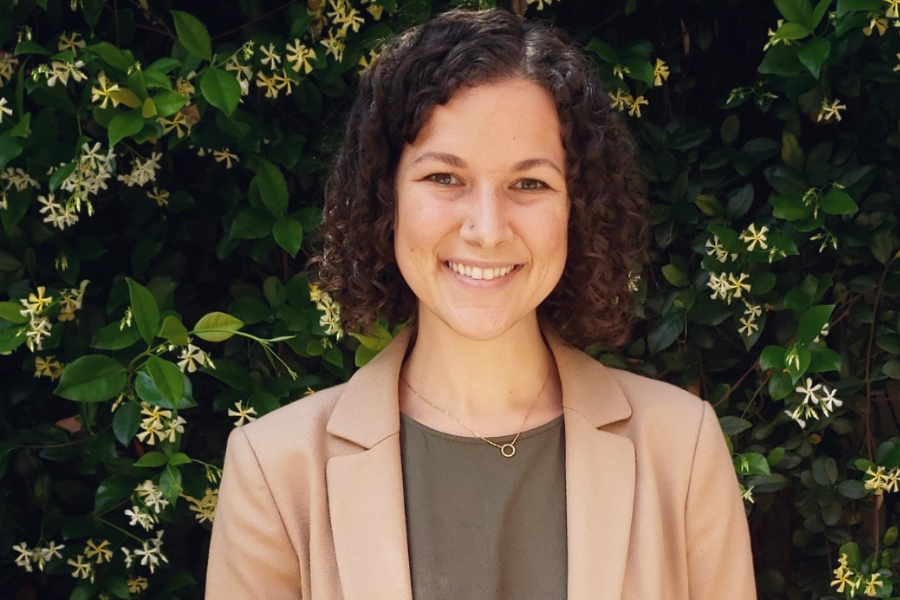Emily Eubanks

"Learning to ask creative, critical questions."
College: Music
Degree Program: Musicology
Degree: Doctoral
Award: Fulbright Study/Research Award (2022)
Why FSU?
The College of Music at FSU felt like the right fit for me because of the Musicology Area's rigorous academic/performance offerings, teaching opportunities, and collegiality. By blending historical and ethnomusicological studies, the Musicology Graduate Program prepares students for a wide-ranging array of career opportunities, both within and beyond academia. The strong emphasis on applied scholarship in the world and historical ensembles also fosters opportunities to gain experiential research as scholar-performers. As a musicology instructor of record, I have had vast opportunities to develop my pedagogical skills and refine my own teaching goals and philosophies. Finally, the Musicology Area also prioritizes building a supportive community of learners, which I found to be a crucial reason for my success throughout my graduate studies.
Motivation to pursue a graduate degree
For me, graduate school was a way to deepen my research and critical thinking skills, not only for my scholarship and teaching but also as a global citizen. A graduate degree in the humanities has taught me a lot about engaging with the world around me in thoughtful, compassionate ways. Beyond gaining specialized knowledge in my field, I also wanted to learn more about how people have used music to foster meaningful experiences, both in the past and present, and what that might teach us about our own lives and values.
Importance and/or impact of research and work
I look at women's contributions to music culture in the nineteenth and twentieth centuries, so I hope that my research helps broaden our understanding of who participated in and influenced musical life during that time. By uncovering the musical activities of often-ignored women, my work contributes to broader efforts to consider who has been left out of traditional music histories and why. Through this revisionist and reconstructionist work, I hope all my students see themselves represented in the music history narratives we explore together.
Tell us about your Fulbright Experience
With the Fulbright Study/Research Award, I was able to spend ten months living and researching in Austria. During this time, I conducted archival, ethnographic, and experiential research for my dissertation project, which explores the music performed in Karoline Pichler’s (1769–1842) Viennese music salon in order to reconsider women’s creative and political agency in the context of the Biedermeier era (1815–1848). I also took German language and musicology courses in Vienna, which allowed me to learn more about my field in the German-speaking world and develop professional connections with an international group of scholars. The experience of being immersed in a new culture also taught me a lot about my own values and perspectives, and the importance of cultural exchange.
Career aspirations
I’m passionate about pedagogy, so I hope to continue teaching and fostering opportunities for students to ask critical questions and develop a love for learning.
Advice for anyone considering graduate school
Graduate school can be a very challenging experience--intellectually, emotionally, and physically--so, look for a program that will not only support your academic goals but also who you are and hope to become as a person. Keep an open mind to new ideas, questions, and perspectives, and never be afraid to ask for help.
Accomplishments during graduate career
One of my proudest accomplishments was getting the opportunity to direct FSU’s Renaissance Instrumental Ensemble for three years. Playing and learning alongside a positive, curious, and creative group of musicians was a highlight of my graduate studies and taught me a lot about ensemble leadership and early music performance. I’ve also presented my research at academic conferences at the regional, national, and international level, which has both helped shape my scholarship and allowed me to network with people from around the world. I am also proud to have received the following awards: Fulbright Study/Research Award, the FSU Summer Research Fellow in Musicology, the American Musicological Society's Virginia and George Bozarth Travel Grant, the Central European History Society's Research Grant, the FSU Dissertation Research Grant, the FSU Orpheus Professorship in Musicology Scholarship, and the FSU Graduate Student Research and Creativity Award.
